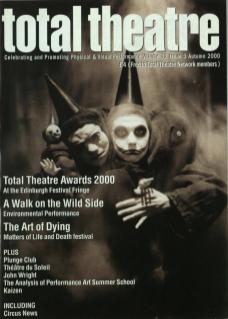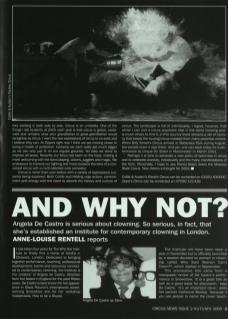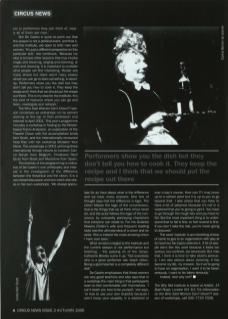It has taken four years for The Why Not Institute to finally find a home at ArtsEd in Chiswick, London. Dedicated to bringing together performance, teaching, professional development, events and resources connected to contemporary clowning, the Institute is the creation of Angela de Castro. Brazilian born but based in England for the past fifteen years, De Castro is best known for her appearance in Slava Polunin's international award-winning Snowshow and for her workshop masterclass, How to be a Stupid.
The Institute will have been open a year in November but is officially launched by a season devoted to women in clowning called Who Said Women Can't Clown?!, which started in September.
This provocative title came from a newspaper review of De Castro's performance in Snowshow. 'It is a great title as well as a good basis for discussion,' says De Castro. 'It's an important issue,’ adds her partner Catherine Bewley, ‘because if you ask people to name the clown teachers or performers they can think of, nearly all of them are men.'
But De Castro is quick to point out that the season is not a political event, and that it, and the Institute, are open to both men and women. 'It's just a different perspective on this particular skill,' she continues. 'Because my idea is to have other seasons that may involve magic and clowning, singing and clowning, or men and clowning. It is important to consider what people will find interesting. People see many shows but there aren't many places where you can go to learn something to develop. Performers show you the dish but they don't tell you how to cook it. They keep the recipe and I think that we should put the recipe out there. This is my idea for the Institute. It is the kind of resource where you can go and learn, investigate and network.’
The Who Said Women Can't Clown?! season comprises six workshops run by women working at the top of their profession and extends to April 2001. This year's programme includes a workshop in fooling by the Bristol-based Franki Anderson, an exploration of the Theatre Clown with the accomplished Linda Kerr Scott, and the internationally renowned Nola Rae with her workshop Broaden Your Mime. The workshops in 2001 will bring three international female clowns to London: Carina Bonan from Belgium, Christiane Paoli Quito from Brazil and Marceline from Spain.
The diversity of the programming is indicative of De Castro's own philosophy and interest in the investigation of the difference between the theatrical and the clown. It is a very broad discussion and one which she raises in her own workshops. ‘We always speculate for an hour about what is the difference and we have many answers. One line of thought says that the difference is logic. The clown follows the logic of the unconscious, that is the things that we all think of but never do, and the actor follows the logic of the conscious, by outwardly portraying characters that everyone can relate to. For me Giulietta Masina [Fellini's wife and frequent leading lady] was the ultimate idea of a clown and an actor. She is indeed the most amazing clown I have ever seen.'
What remains integral to the Institute and the current season is not performance but teaching – the passing on of the recipe. Catherine Bewley sums it up: 'Not everybody who is a good performer can teach clown. Being a good teacher is a completely different skill.’
De Castro emphasises that these women are very good teachers and also says that in a workshop the main thing is that participants learn to feel comfortable with themselves. ‘I can't teach you how to be yourself,' she says, ‘or how to use your own stupidity because I won't know your stupidity in a weekend or over a day's course. How can I? I may know up to a certain point but it is up to you to go beyond that. I also stress that you have to have a lot of patience because it's not in a weekend that you're going to get it. You have to go through the rough bits and you have to fail. But the most important thing is to understand that to fail is fine, to feel scared is fine. If you don't take the risk, you're never going to discover.’
The word 'institute' is an interesting choice of name to give to an organisation with play at its heart but De Castro defends it. ‘A lot of people don't like this word because it looks too serious, too confined, too structured. But I like that. I think it is time to take clowns seriously. I am very serious about clowning. It has become my life, my mission. So if we're going to have an organisation, I want it to be taken seriously. I want to be taken seriously.’
Indeed. And why not?
The Why Not Institute is based at ArtsEd. 14 Bath Road, London W4 1LY.


